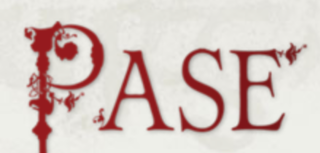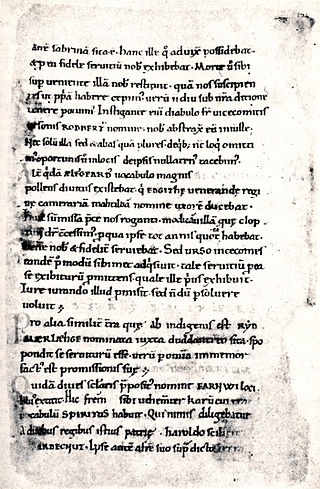Related Research Articles

Ealdred was Abbot of Tavistock, Bishop of Worcester, and Archbishop of York in early medieval England. He was related to a number of other ecclesiastics of the period. After becoming a monk at the monastery at Winchester, he was appointed Abbot of Tavistock Abbey in around 1027. In 1046 he was named to the Bishopric of Worcester. Ealdred, besides his episcopal duties, served Edward the Confessor, the King of England, as a diplomat and as a military leader. He worked to bring one of the king's relatives, Edward the Exile, back to England from Hungary to secure an heir for the childless king.

Odathe Good was a 10th-century Archbishop of Canterbury in England. The son of a Danish invader, Oda became Bishop of Ramsbury before 928. A number of stories were told about his actions both prior to becoming and while a bishop, but few of these incidents are recorded in contemporary accounts. After being named to Canterbury in 941, Oda was instrumental in crafting royal legislation as well as involved in providing rules for his clergy. Oda was also involved in the efforts to reform religious life in England. He died in 958 and legendary tales afterwards were ascribed to him. Later he came to be regarded as a saint, and a hagiography was written in the late 11th or early 12th century.

Wulfstan was Bishop of Worcester from 1062 to 1095. He was the last surviving pre-Conquest bishop. Wulfstan is a saint in the Western Christian churches.
Wulfstan was an English Bishop of London, Bishop of Worcester, and Archbishop of York. He is thought to have begun his ecclesiastical career as a Benedictine monk. He became the Bishop of London in 996. In 1002 he was elected simultaneously to the diocese of Worcester and the archdiocese of York, holding both in plurality until 1016, when he relinquished Worcester; he remained archbishop of York until his death. It was perhaps while he was at London that he first became well known as a writer of sermons, or homilies, on the topic of Antichrist. In 1014, as archbishop, he wrote his most famous work, a homily which he titled the Sermo Lupi ad Anglos, or the Sermon of the Wolf to the English.
Ealdwulf was a medieval Abbot of Peterborough, Bishop of Worcester, and Archbishop of York.
Wulfhelm was Bishop of Wells before being promoted to the Archbishopric of Canterbury about 926. Nothing is known about his time at Wells, but as archbishop he helped codify royal law codes and gave lands to monasteries. He went to Rome soon after his selection as archbishop. Two religious books that he gave to his cathedral are still extant.

Bookland was a type of land tenure under Anglo-Saxon law and referred to land that was vested by a charter. Land held without a charter was known as folkland.

The Prosopography of Anglo-Saxon England (PASE) is a database and associated website that aims to construct a prosopography of individuals within Anglo-Saxon England. The PASE online database presents details of the lives of every recorded individual who lived in, or was closely connected with, Anglo-Saxon England from 597 to 1087, with specific citations to each primary source describing each factoid.

Sarah Rosamund Irvine Foot is an English Anglican priest and early medieval historian, previously serving as Regius Professor of Ecclesiastical History at the University of Oxford. On 8 July 2023, she became the first woman to serve as Dean of Christ Church, Oxford.
Charles Patrick Wormald was a British historian born in Neston, Cheshire, son of historian Brian Wormald.
Henry Royston Loyn, FBA, was a British historian specialising in the history of Anglo-Saxon England. His eminence in his field made him a natural candidate to run the Sylloge of the Coins of the British Isles, which he chaired from 1979 to 1993. He was Professor of Medieval History in the University College of South Wales and Monmouthshire and afterwards Professor of Medieval History at Westfield College in the University of London.
Urse d'Abetot was a Norman who followed King William I to England, and became Sheriff of Worcestershire and a royal official under him and Kings William II and Henry I. He was a native of Normandy and moved to England shortly after the Norman Conquest of England in 1066, and was appointed sheriff in about 1069. Little is known of his family in Normandy, who were not prominent, but he probably got his name from the village Abetot. Although Urse's lord in Normandy was present at the Battle of Hastings, there is no evidence that Urse took part in the invasion of England in 1066.
Regenbald was a priest and royal official in Anglo–Saxon England under King Edward the Confessor. His name suggests that he was not a native Englishman, and perhaps he was German or Norman. He first appears in history as a witness to a royal document in 1050, and remained a royal chaplain and clerk throughout the rest of King Edward's reign. Many royal documents give Regenbald the title of "chancellor"; but whether this means that he acted in a manner similar to the later Lord Chancellors is unclear, as some of the documents may be forgeries or have been tampered with. Whatever Regenbald's actual title, King Edward rewarded him with lands and also granted him the status, but not the actual office, of bishop. Regenbald continued to serve the English kings after the Norman Conquest of England, although whether he served King Harold II of England is unclear. His date of death is unknown, but it was probably during the reign of either King William I or King William II. After his death, some of his lands became part of the endowment of Cirencester Abbey in 1133.

Hemming's Cartulary is a manuscript cartulary, or collection of charters and other land records, collected by a monk named Hemming around the time of the Norman Conquest of England. The manuscript comprises two separate cartularies that were made at different times and later bound together; it is in the British Library as MS Cotton Tiberius A xiii. The first was composed at the end of the 10th or beginning of the 11th century. The second section was compiled by Hemming and was written around the end of the 11th or the beginning of the 12th century. The first section, traditionally titled the Liber Wigorniensis, is a collection of Anglo-Saxon charters and other land records, most of which are organized geographically. The second section, Hemming's Cartulary proper, combines charters and other land records with a narrative of deprivation of property owned by the church of Worcester.
Cyneweard of Laughern or simply Cyneweard was a mid-11th century Anglo-Saxon thegn and sheriff in Worcestershire, England. Probably the son of Æthelric Kiu and grand-nephew of Wulfstan Lupus, Archbishop of York (1003–1023), he was one of the leading nobles of the county at the Norman Conquest of England. On the death of Edward the Confessor he held lands in Gloucestershire and Warwickshire as well as Worcestershire.
Geþyncðo, meaning “Dignities”, is the title given to an Old English legal tract on status and social mobility, probably written by Wulfstan (II), Archbishop of York between 1002 and 1023. It is sometimes known as one of the so-called 'promotion laws', along with Norðlleoda laga, and both these texts belong to a legal compilation on status, dubbed ‘the Geþyncðu group’ by the historian Patrick Wormald. Though the extent to which these reflect reality is a topic of some debate, they constitute one of the most valuable primary documents for an understanding of social status in late Anglo-Saxon England.
The Oswaldslow was a hundred in the English county of Worcestershire, which was named in a supposed charter of 964 by King Edgar the Peaceful. It was actually a triple hundred, composed of three smaller hundreds. It was generally felt to be named after Bishop Oswald of Worcester, and created by the merging of Cuthburgelow, Winburgetreow and Wulfereslaw Hundreds.
Catherine E. Karkov is professor of History of Art and head of the School of Fine Art, History of Art and Cultural Studies at the University of Leeds. Her research centres on early medieval art, especially Anglo-Saxon art, and she has published three monographs. Her first concerns Anglo-Saxon art; the second one on the relation between text and image in Anglo-Saxon literature; and the third on how Anglo-Saxon writers imagined England as a place, how Anglo-Saxon England is understood by modern audiences, and the "fraught history of 'Anglo-Saxon' studies".
Beornrad was Archbishop of Sens from 785/6 until his death. He was Alcuin's cousin and was also related to Willibrord by blood.
References
- 1 2 "The Leofwinesons: power, property and patronage in the early English kingdom", SOLO: Bodleian Libraries Online. Retrieved 5 March 2023.
- 1 2 3 4 "Professor Stephen Baxter", St Peter's College, Oxford. Retrieved 5 March 2023.
- 1 2 3 4 "Dr Stephen Baxter, DPhil (Oxon)", King's College London. Archived from the original on 8 October 2010.
- ↑ "Who's Here", St Peter's College, Oxford. Archived on 23 December 2014.
- ↑ "Appointments", Oxford University Gazette, vol. 145, no. 5071 (2 October 2014), p. 14. Retrieved 5 March 2023.
- ↑ "Recognition of Distinction 2020", Oxford University Gazette, vol. 151, no. 5293 (12 November 2020), p. 6. Retrieved 5 March 2023.
- ↑ "Team", Prosopography of Anglo-Saxon England. Retrieved 6 March 2023.
- ↑ "Introduction", Prosopography of Anglo-Saxon England. Retrieved 6 March 2023.
- ↑ "Project Team", Exon Domesday. Retrieved 5 March 2023.
- ↑ "About", Exon Domesday. Retrieved 6 March 2023.